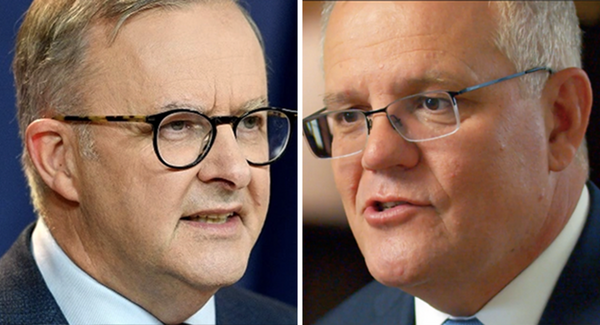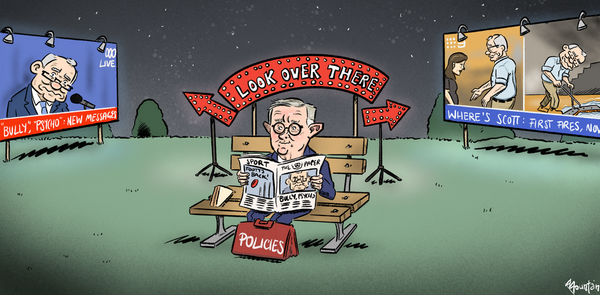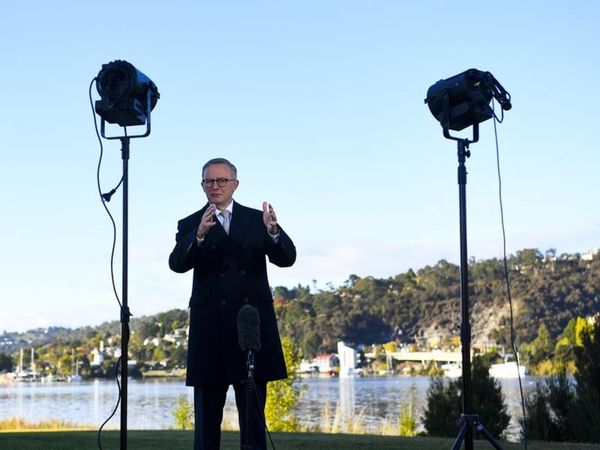
The prime minister, Scott Morrison, is imploring voters not to risk a change to an “uncertain” future under the opposition, while the Labor leader, Anthony Albanese, says now is the time to seize the opportunity for better times ahead.
After Morrison visited the governor general on Sunday to call a 21 May election, the two leaders began the 41-day election campaign by outlining their pitch to voters.
The governor general will formally prorogue the 46th parliament and dissolve the House of Representatives on Monday morning, allowing the writs to be issued for the six-week campaign.
Morrison, who made the marginal New South Wales seat of Gilmore his first visit on Sunday afternoon, said while his government had not been perfect, the choice was between a “government that you know and that has been delivering and a Labor opposition that you don’t”.
“This election is about you – no one else,” he said.
“It’s about our country and it’s about its future. Above all, this election, as all elections are, this election is a choice.
“It’s a choice between a strong economy and a Labor opposition that would weaken it. It’s a choice between an economic recovery that is leading the world and a Labor opposition that would weaken it and risk it.”
Morrison is keen to paint the coming contest as a choice about the country’s economic security, in what he described as the most unstable and uncertain time since the second world war. He is also painting Albanese, who polling suggests is nudging ahead as preferred prime minister, as an unknown risk.
But Albanese, who polls suggest is more likely to win next month’s election, is keeping pressure on Morrison by framing the contest as a referendum on the government, saying the Coalition’s record showed it did not deserve to be re-elected for a fourth term.
The Labor leader said he was “humbled” to put himself forward as prime minister, saying he was ready for a “better future”.
“Australians deserve better. This government doesn’t have an agenda for today, let alone a vision for tomorrow,” Albanese said.
He said while he was anticipating a scare campaign about a change of government – saying “fear can be a powerful emotion” – he was hopeful he would appeal to a sense of optimism.
“If I have the honour of serving as your prime minister, I can promise you this: I will lead with integrity and I will treat you with respect. I will restore faith in our political system by getting rid of the waste and rorts, and establishing a strong anti-corruption commission.
“I won’t go missing when the going gets tough. I will accept the responsibility that comes with high office. I will lead a government that repays and rewards your hard work. A government that reflects the decency and compassion and courage of the Australian people.
“I say to my fellow Australians, this is our time, our time to seize the opportunities that are before us, our time to create a better future where no one is held back and no one is left behind,” he said.

Despite the Liberal party being rocked by internal divisions in its term in government, Morrison also chose to highlight the government’s stability, saying his team had been “tested” in difficult times.
“It’s a choice between a strong and tested government team that has demonstrated our ability to make difficult and tough choices in tough times, and a Labor opposition who has been so focused on politics over these past few years that they still can’t tell you what they do, who they are, or what they believe in, and what they stand for,” Morrison said.
“It’s a choice between a strong future and an uncertain one. It’s a choice between a government you know and a Labor opposition that you don’t.
“Our government is not perfect – we’ve never claimed to be, but we are upfront and you may see some flaws but you can also see what we have achieved for Australia in incredibly difficult times.”
Morrison also said that Alan Tudge, who was stood aside as part of an investigation into his relationship with a staffer, remained in his cabinet.
Albanese rejected the prime minister’s criticism that Labor did not know what it stood for or that he was an unknown quantity, and used his opening pitch to voters to talk up his experience in the Rudd and Gillard governments.
“They [Australians] know what my record is. They know that I have a long record of public service. They know that that’s been defined by collaboration, not conflict. By unity, not division. By achieving outcomes.
“We are ready for government, we will be the most experienced incoming Labor government in history,” Albanese said.
Lagging in the polls and in personal approval ratings, Morrison was also asked what his message was to voters who had delivered the Coalition its unexpected victory in 2019, but were now unhappy with him personally.
“This election, others will seek to make it about me,” Morrison said.
“It’s about the people watching this right now. It’s about them. What we’ve demonstrated over these past three years is the ability to make those decisions that has ensured that Australia’s recovery is leading the world.”
Before formally kickstarting the campaign, the prime minister released a video to social media, saying Australia was facing “a world that has never been more unstable since the time of the second world war”.
“There’s drought. There’s floods. There’s fire. There’s pandemic. There is now war.”
Shortly after, Labor released its response to the video, including criticism of the government’s “decade of climate inaction”, and footage of Morrison repeatedly saying “that’s not my job”.
“No more mistakes. No more excuses. No more Morrison,” it says.
Since handing down the federal budget a fortnight ago, the prime minister has been attempting to campaign on the Coalition’s economic credentials, accusing Albanese of trying to “slide” into office without scrutiny.
However, the post-budget bounce Morrison had been relying on ahead of the May poll was derailed after the NSW Liberal senator Concetta Fierravanti-Wells launched an extraordinary spray in the Senate about the prime minister’s character.
He was also forced to fend off criticism from NSW Liberal Catherine Cusack, and the man he knocked off for preselection, Michael Towke, who accused Morrison of using race against him in a controversial preselection ballot in 2007. A high court challenge against preselections in the NSW branch of the party was dismissed on Friday.
Morrison has spent the past week campaigning in a swathe of marginal NSW seats, including Banks, McMahon, Parramatta, Shortland, Dobell and Robertson. He has also visited marginal seats in Tasmania and Victoria.
Albanese has visited marginal seats across NSW, Queensland, Western Australia and South Australia.
Labor holds a notional 69 seats in the 151-seat House of Representatives, so needs a net gain of four seats from the Coalition to hold more seats in the House, and a net seven seats to form majority government.
The Coalition holds 75 seats, so also needs to win seats to have a majority.
There are seven independent and minor party MPs, with most expected to retain their seats.
Labor has been talking up its commitments to aged care unveiled in last week’s budget-in-reply speech, and has been campaigning on Morrison’s character.
Speaking in Adelaide in the marginal seat of Boothby on Thursday, Albanese said the government was behaving like an opposition.
“They’re running a negative campaign. They’re going to have a really difficult month over the next month, because Scott Morrison is running like an opposition leader. He’s stopped governing.”
A Guardian Australia analysis of seat visits by the two leaders shows that since parliament rose in December last year, Morrison and Albanese have spent most of their time campaigning in NSW and Queensland.
The latest Guardian Essential poll shows the Coalition is starting the campaign from behind, with Labor on 50%, the Coalition on 45%, and 5% of respondents undecided on the latest two-party-preferred “plus” measure.










